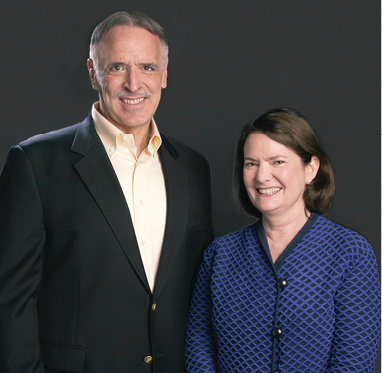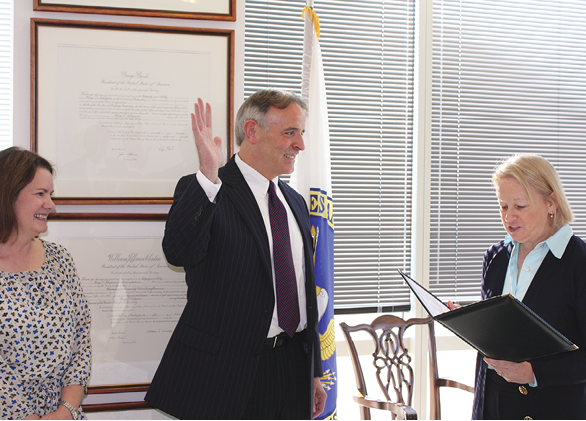
John J. Cross III ’81 met Meredith Brinegar ’82 at Blackacre on Meredith’s first day of law school. They were engaged at the beginning of her second year and married in Nashville when John graduated. In the three decades that they have been practicing law, they’ve created a family brand of public service that has left its mark on the country.
John Cross is regarded as one of the country’s top municipal finance experts. Meredith B. Cross is one of the leading corporate securities experts, having spent a combined 12 years at the Securities and Exchange Commission—the last three as director of the Division of Corporation Finance—helping save the agency after the 2008 financial crisis. Their careers have given them not only a front seat to history, but the opportunity to get in the game and shape the result.
The two lived in Atlanta after graduating from Vanderbilt Law School. Meredith clerked for Judge Albert J. Henderson of the 11th Circuit of the U.S. Court of Appeals before entering private practice. In 1987, they moved to Washington, D.C., for a year where John got an LL.M. in taxation from Georgetown and their son, Joseph, was born. “We really liked D.C.” Meredith said. “It was fun, interesting, beautiful, livable, and a great place to raise our son, who”—she added with pride—“is now in graduate school at Columbia and is teaching a writing course for freshmen. It also was a great place for women professionals. There were lots of women in high-level government positions, so I had role models.”
In 1990, they decided to move to D.C. permanently. John went to the chief counsel’s office at the Internal Revenue Service, working in the municipal bonds area. Meredith landed at the SEC’s Corporate Finance division, rising from a fellow in the chief counsel’s office to deputy director of the division, which oversees the information that companies provide the public and how that information is disclosed. “One of the hardest issues we faced at that time was how to make the securities laws work with the Internet,” she said. “At the time, we didn’t realize how transformative that technology would be. Now we know there are tremendous benefits to the investor and the market for online access. But there are also tremendous opportunities for abuse.”

John left the IRS in 1993 and joined Hawkins Delafield & Wood, a national law firm that focuses on public finance and public projects, where he continued his municipal finance practice. In 1998, Meredith left the SEC for a securities practice with WilmerHale. For much of the next decade, they built their careers in the private sector.
In 2006, John joined the Treasury Department to oversee legislative, regulatory and budgetary tax matters concerning the $3.8 trillion municipal bond market. “Municipal bonds were one of the first things impacted by the economic crisis,” he said. “They were kind of like the canaries in the coal mine.” Many municipalities’ bonds became caught up with the subprime mortgage crisis indirectly through investments by municipal bond insurers, and John focused on helping municipalities get out of the mess.
After President Obama was elected, John was on the team drafting the bill that became the American Recovery and Reinvestment Act of 2009. “It was a fascinating time to be at Treasury,” he said. “I was in Treasury’s Office of Tax Policy, and we worked on tax legislative initiatives for the administration and on IRS regulations. We had meetings in the West Wing to talk about the Build America bond programs.”
The financial crisis hit the SEC especially hard, with public opinion strongly suggesting that the agency did not do enough to protect investors. In April 2009, SEC Chair Mary Schapiro recruited Meredith to come back to the agency, this time as director of the Division of Corporation Finance. “The idea of saying no when the agency was in terrible straits, when people were calling for it to be abolished, wasn’t an option,” she said. “I wanted to go help and restore confidence in the agency.”
In the next three and a half years, Meredith testified before Congress nine times. She led her division as they implemented the Dodd-Frank Act and the Jumpstart our Business Startups (JOBS) Act. The division also recommended nearly 60 new rules for the SEC to address changes that were needed after the financial crisis. “I had a fabulous time,” Meredith said.
She left the SEC in December 2012 when Schapiro left her post. Washingtonian magazine included her in a select group of five top outgoing Obama administration officials, speculating on the prospects for “Obama’s best and brightest legal talent.” Meredith rejoined WilmerHale in the transactional and securities departments. “My practice combines traditional corporate and securities law with helping clients who are having various kinds of crises,” she said. She is also part of the firm’s strategic response and counseling group.
 In September 2012, John jumped from Treasury to the SEC, heading up the newly formed Office of Municipal Securities, created when the Dodd-Frank Act called for the creation of a standalone office reporting directly to the chairman that administers commission rules regarding the municipal securities market. When he was appointed, John said, “I look forward…to promoting sound disclosure, sensible practices, and enhanced price transparency to foster a vibrant, sustainable future for the over $3.7 trillion municipal securities market that is so critical to financing our nation’s public infrastructure.”
In September 2012, John jumped from Treasury to the SEC, heading up the newly formed Office of Municipal Securities, created when the Dodd-Frank Act called for the creation of a standalone office reporting directly to the chairman that administers commission rules regarding the municipal securities market. When he was appointed, John said, “I look forward…to promoting sound disclosure, sensible practices, and enhanced price transparency to foster a vibrant, sustainable future for the over $3.7 trillion municipal securities market that is so critical to financing our nation’s public infrastructure.”
Meredith looks back to her days at VLS with fondness. “The people at Vanderbilt gave you a good preparation for the realities of practice,” she said. “Being a good, thoughtful communicator mattered there. Testifying before Congress—you don’t get very far without speaking plainly. Vanderbilt taught me that.
“We didn’t have a life plan to go into the government,” she continued. “We are definitely a team. We map it all out together. We’re cheerleaders for each other.” Looking back over the last 30 years, John sums up their experience. “We have been witnesses to history. It’s been quite a run.”